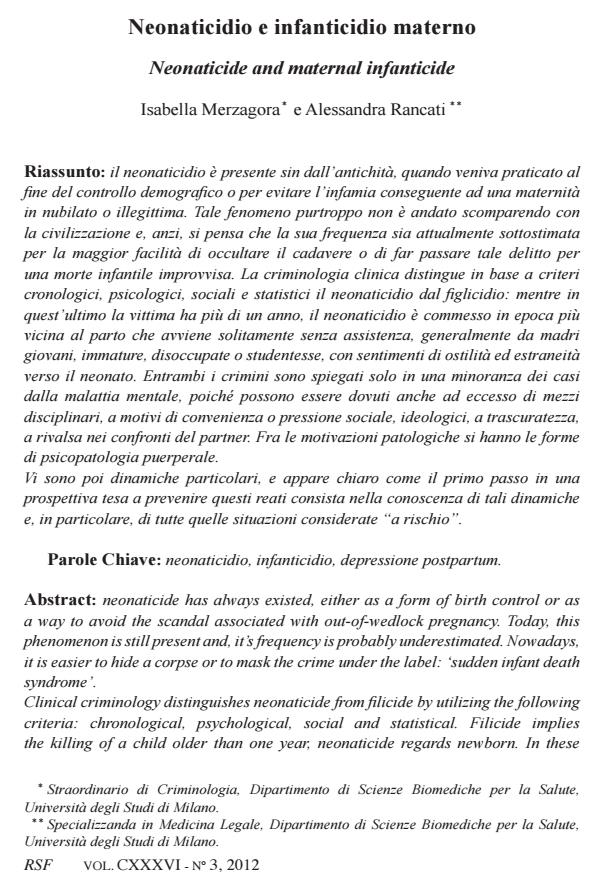Neonaticide and maternal infanticide
Journal title RIVISTA SPERIMENTALE DI FRENIATRIA
Author/s Isabella Merzagora, Alessandra Rancati
Publishing Year 2012 Issue 2012/3
Language Italian Pages 18 P. 107-124 File size 1713 KB
DOI 10.3280/RSF2012-003007
DOI is like a bar code for intellectual property: to have more infomation
click here
Below, you can see the article first page
If you want to buy this article in PDF format, you can do it, following the instructions to buy download credits

FrancoAngeli is member of Publishers International Linking Association, Inc (PILA), a not-for-profit association which run the CrossRef service enabling links to and from online scholarly content.
Women, in Italy, that commit a crime and are pled not guilty by reason of insanity are hospitalised in the Forensic Psychiatric Hospital of Castiglione delle Stiviere. Among the eighty women at present institutionalised, ten are infanticide. The average age at the time of the crime was 35. The predominant geographical origin of these mothers is northern and central Italy. The most frequent diagnosis given is psychotic depression. The therapeutic and rehabilitative strategies used in the hospital aim first of all at reducing the social dangerousness of the patients. This objective is achieved thanks to the clinical improvement of the women: i.e. sufficient insight - on their crime and illness - and self-control on aggression. The expected outcome of these strategies is social reintegration. In the case of filicide psychotherapy plays an important role in reconstructing an understanding of the crime and in enhancing an "inner rebirth" necessary to cope with the complexities of the future. Infanticide mothers are cared for by their parents and relatives. Their husband more often than not are absent. Women who commit infanticide - often during a psychotic break - recover psychological stability relatively soon after the crime. However, the working-through process is always tough and an increased risk of self inflicted injuries exists. To guarantee a "safe discharge" it is important to take into account: patient, family, relatives involved and other potential victims such as siblings, though having other children seems to be a protecting factor towards social recovery and psychological reconstruction, not a risk. Three out of the ten infanticide mothers are close to being discharged.
Keywords: Infanticide, filicide, mothers, forensic psychiatric hospital, treatment.
Isabella Merzagora, Alessandra Rancati, Neonaticidio e infanticidio materno in "RIVISTA SPERIMENTALE DI FRENIATRIA" 3/2012, pp 107-124, DOI: 10.3280/RSF2012-003007